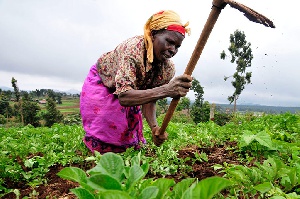Actors in the agriculture sector are reacting variously to Bank of Ghana’s initiative to attract funding to the sector, with some commenters asking for direct cash transfers to farmers, whilst others favour agric insurance over the central bank’s offer of guarantees.
Richard Nunekpeku, Chief Farmer of Anyako Farms at Torgorme in the Volta Region, believes that theGH¢100 million guarantee the central bank is making available to banks to encourage them to lend to farmers is a step in the right direction. But he wants whatever funds banks will make available through this guarantee to reach farmers who need it most.
"The BoG must make sure that these monies do not end up with already established farms and agro-processors. Such institutions should go for straight commercial loans, because if a bank is comfortable that those guys can pay, they shouldn’t be waiting for this guarantee," he told the B&FT in an interview.
The commercial banks, he said, should look at emerging farms with basic infrastructure and systems that need financial support to grow.
"It is only that way that the impact can be felt. If not, it will be another money to guarantee existing farms. I want this facility to benefit local industry or the local people who are struggling to raise money and do not have any foreign financial inflows," he said.
Agric-insurance
Charles Boahene, Chief Farming Officer at Nkami Farms in the Afram Plains, thinks that aside the guarantee, agric insurance is another of the several measures required to turn the fortunes of Ghana’s agriculture around.
"Interest rates at the banks are very high and this makes it very difficult for famers to pay off their loans. In my opinion, the most important approach to share risk is agric insurance. Government should rather support insurance companies to go into agric insurance so farmers can be well protected," he said.
He added that: "By giving out loans with flexible terms of payment it will create a level playing field for us to compete on the international stage and also provide support for mechanized farming," he added.
Direct intervention
On his part, CEO of Somanya based Farm Management Services Limited (FMSL) Ghana, Davies Narh Korboe, said whilst the guarantee is not out of place, he hopes it is "not going to be same as current bank financing."
Mr. Korboe, who is the 2009 National Best Farmer, is of the view that the funds should be channelled directly to farmers so they can buy equipment and building infrastructure.
"The funds should be disbursed through the commercial farmers who will be made to sign off taker agreement with the smallholder/peasant farmers," he said.
Strong measures needed
Alberta Nana Akyaa Akosa, General Manager of the National Food and Agriculture Show (FAGRO), believes the BoG’s initiative can succeed only if the appropriate measures are put in place.
"The right people who understand agric issues on the ground should be put in charge. They should be able to advice farmers, and farming groups, on the right thing to do, whiles assessing their own internal risk," she said.
Banks, she urged, should set clear roadmaps as to what farmers or what the agric sector needs to do to, adding that, the funds should not be given to only commercial farmers who want to expand their farms but also start-ups.
"The government should develop youth in agric modules for start-ups so that they can fully benefit and support food security."
Known as the Ghana Incentive-Based Risk Sharing System for Agricultural Lending (GIRSAL), the central bank’s initiative is aimed at addressing the challenges faced by agricultural value chain actors in accessing finance.
The target of GIRSAL is to double private sector lending to the agricultural sector from the curent 4 percent average to 8 percent in 5 years or even better," BoG Governor, Dr. Abdul Nasiru-Issahaku, said at the launch of the initiative on October 13, 2016.
GIRSAL is expected to commence in the second quarter of next year and will ultimately see to it that both the potential and real risks associated with lending to agriculture and agribusiness are minimised.
Despite contributing about 22percent to GDP, the agriculture sector suffers significantly from lack of funding, as financial institutions shy away from it due to perceived risks which include farmers’ over-reliance on rainfall.
Business News of Wednesday, 9 November 2016
Source: B&FT













